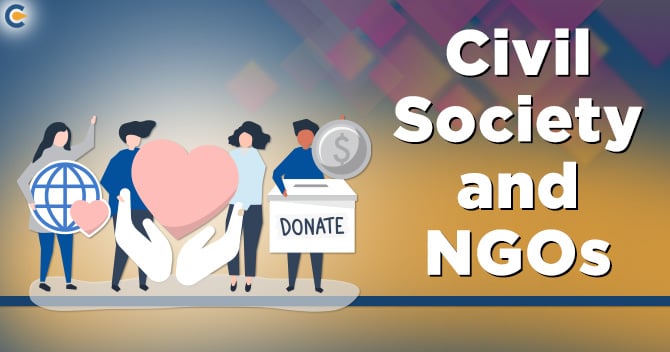NGOs are an essential part of society, and they work for the betterment of the people. They have emerged as a vital ingredient of the country’s development which embraces the needy ones and helps them grow. The majority of NGOs aim at building self-reliant development.
On the other hand, civil society is a group of volunteers working for the interest of the voters. Civil society and NGOs emerged as a vital component of the community that promotes safety and awareness for the people. The main discrepancy between these two entities is that the civil society is deemed an association rather than a state or a family, thus acting as a proactive part of social, economic, and cultural activity. Meanwhile, NGOs is referred to as non-profit organization[1] backed by a team of volunteer organized at local, regional, or international level.
Non-governmental organizations: The NGOs and Civil Society


NGOs are autonomous bodies that conduct their activities without the intervention of the government. However, their establishment seeks some legal formalities. Being a non-profit-oriented group, NGO works in the interest of society without accepting any rewards. Primarily, NGO work in the field of development, social justice, and human rights.
The government also plays a crucial role in funding NGOs across the nation. Here, the government funding process isn’t consistent, and it depends on the scenarios NGOs are dealing with. However, that doesn’t mean the NGOs hold any governmental status. There is a common misconception among the people that voluntary organizations and NGOs are identical. All NGOs don’t necessarily serve the same purpose, and nor they represent the same category.
In the past few years, the country’s development has touched new height because of progressive interpretation of the Constitution that not only includes economic progress for citizens but also render support for gender equity, social justice, empowerment, and quality of life. To achieve the fleet, states seek proactive participation of civil society w.r.t developmental initiatives and programs. Thus, NGOs are the worthy contenders accountable for initiating development processes by acting as an operational arm of civil society.
Relationship between the Indian state and NGOs
In India, state policies have a direct impact on the activities of the NGOs. There are a dozen programs, sponsored by the government, that provide financial aid to NGOs. Several official committees across the country have realized that voluntary organizations’ involvement is vital for the development of society.
Balwant Rai Mehta Committee, 1957
The country’s governance is paying special attention to NGOs and workers. These entities proved to be quite useful when it comes to the implementation of community development schemes. Furthermore, additional importance is also given to the principle that supports the utilization of these schemes by people’s own local organizations.
Rural-Urban Relationship Committee, 1966
Local volunteer groups can play a vital role as far as mobilization of public support in municipal body activities is concerned. These organizations can ensure constant and close contact with people.
Read our article: All you need to Know before Starting an NGO in India
Civil Society
Through social trust, shared strategy, and networking, civil society organizations facilitate collaboration between two or more individuals. Due to countless advantages, Democracies provide 100% support to such cooperative conduct. The current economic growth model is giving emphasis to the civil society sector for achieving sustainable and equitable development goals.
Civil society organizations have set themselves apart from the scope of state and market traditional space. They are in full authority to convince all institutions to make them sensitive towards citizens’ needs and rights.
The voluntary sector has made some worthwhile contributions w.r.t discrimination, poverty, exclusion, and deprivation via an initiative that triggers awareness, training, social mobilization, research, service delivery, and advocacy. The voluntary sector is acting as a non-political connection between the government and citizens of the country.
Different types of civil society organizations
- Civil rights advocacy organizations Play vital in securing the legal & human rights of migrants, women, people with disabilities, sex workers, HIV, tribal people, and alike.
- Moreover, civil liberties advocacy organizations avoid paying attention to particular social classes. Instead, they believe in providing support for human rights and equal civil liberties of all people, regardless of their caste, demographic, and monetary conditions.
- Community-based organizations, farmers’ cooperative, citizens’ groups. It increases the intervention of the citizens in public policy problems to ensure good quality of life and harmony in a given society.
- International peace and human rights organizations: Believe in promoting peace and human rights.
Role of civil society including NGOs
- Collection of the information.
- Conducting in-depth research.
- Creating political will via building awareness.
- Increasing awareness among the community.
- Enhancing resilience of vulnerable poor citizens.
- Putting team efforts to develop and allocate the project to ensure a 100% impact and greater coverage.
Conclusion
Both civil society and NGOs engaged in fostering the safety and human rights of the individuals. There is a negligible difference that exists between civil society and NGOs because they have different working protocols. However, the intention and goal are more or less identical. They work in the direction of upliftment of the poor individuals and also foster their human rights.
Moreover, civil society plays a key role in participating in social issues and help in finding proactive solutions, w.r.t poverty, and discrimination. Their job is the create awareness among the concerned group. Therefore, as such, NGOs have been a driving force of the country and acting as an organizational arm of civil society.
Those who are willing to pursue social service on a broader spectrum can opt for NGO registration and ensure negligible government intervention. Get in touch with us if you wish to turn your social working framework into a legal entity.
Read our article: An Outlook: Registering an NGO in India











